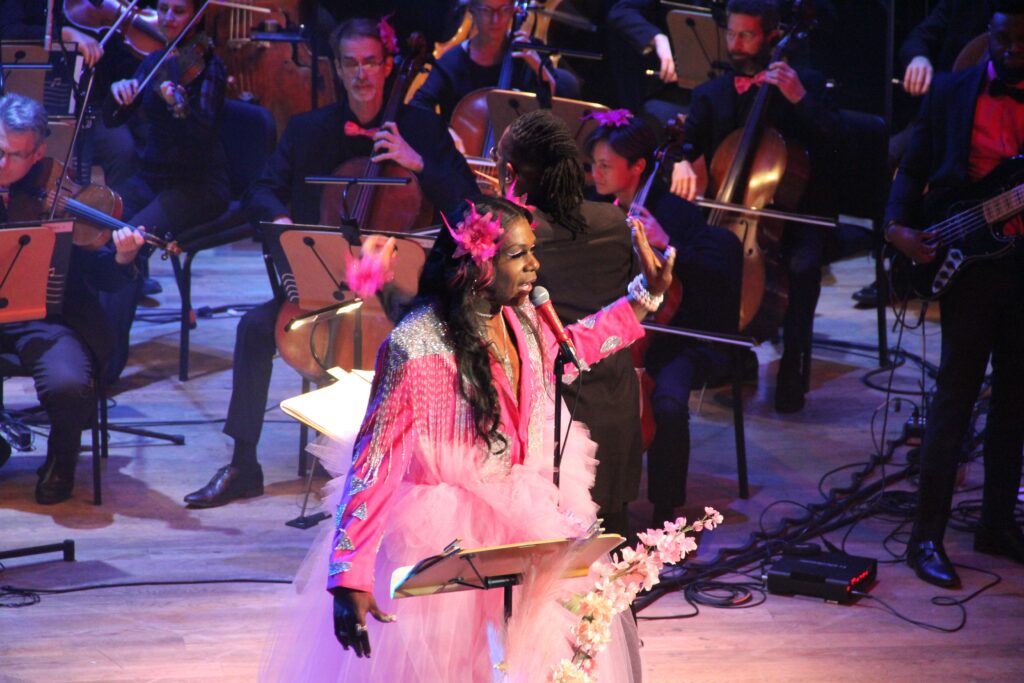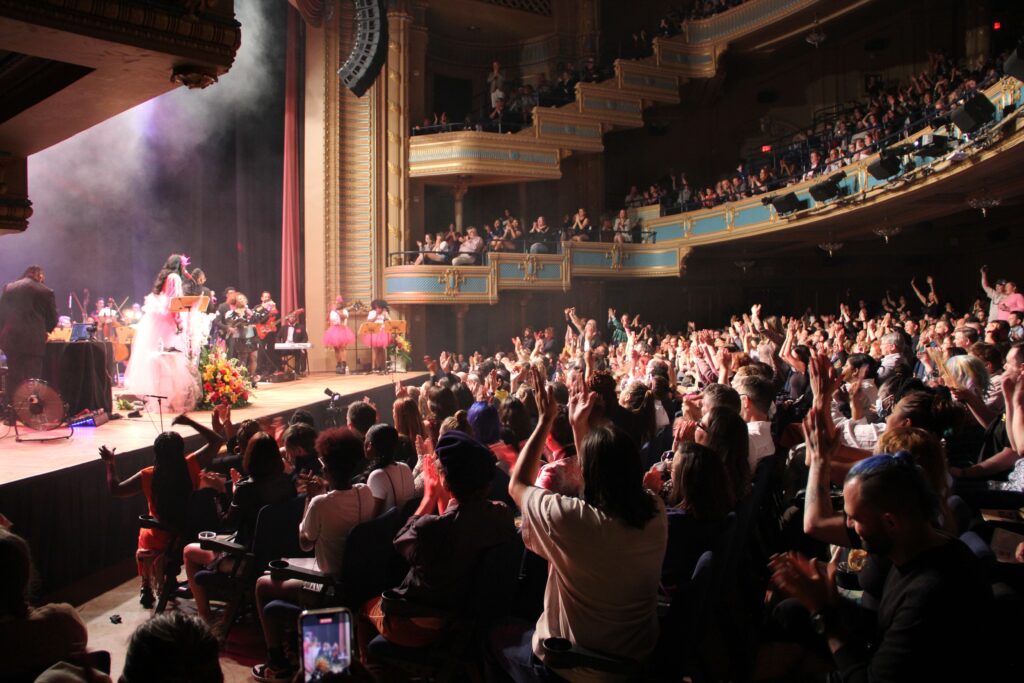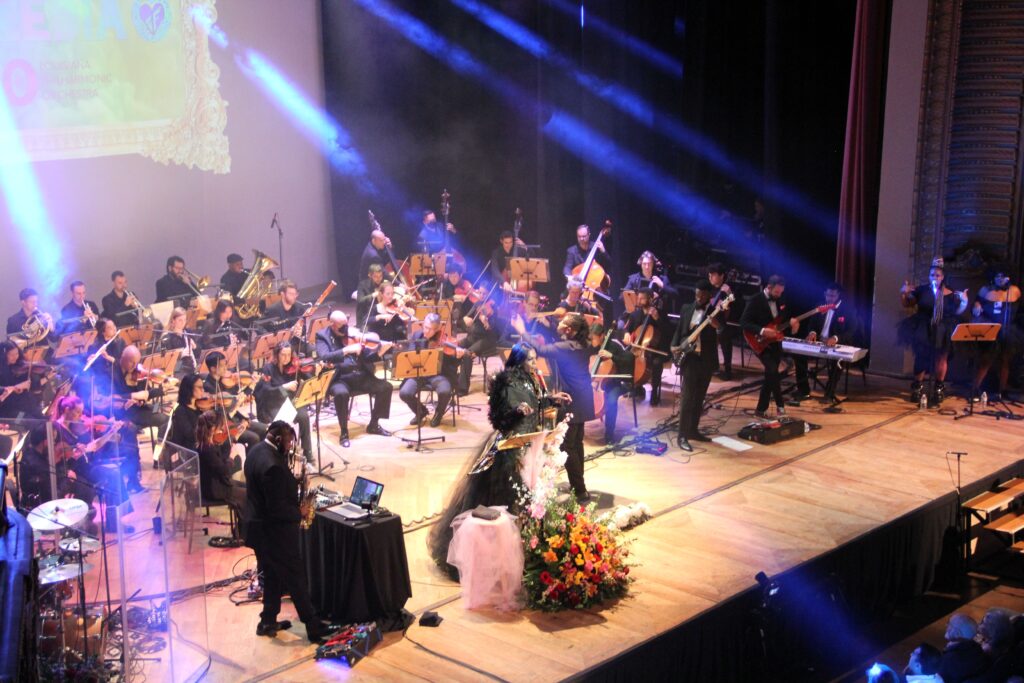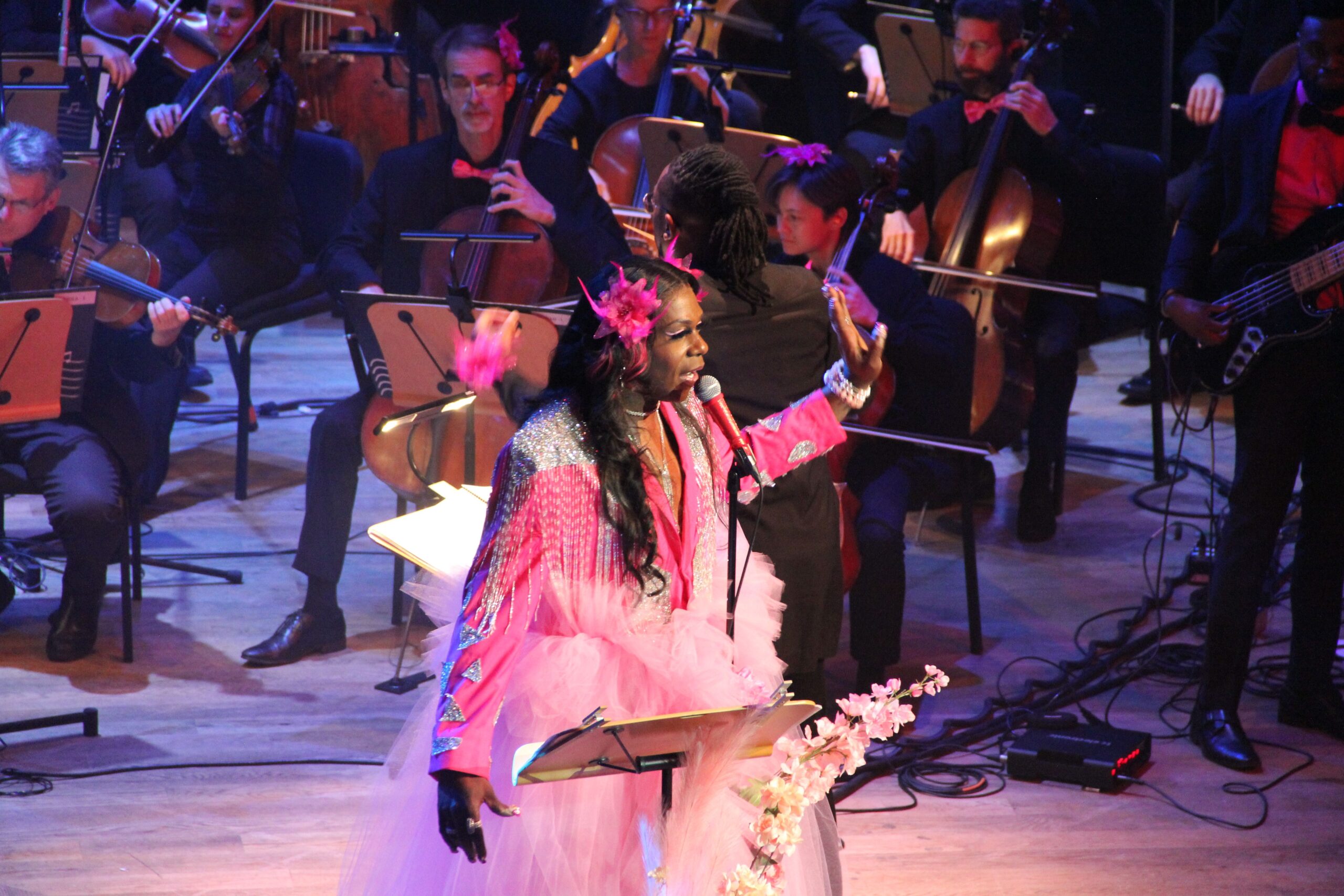In the latest of a string of collaborations between classical music and hip-hop, the Louisiana Philharmonic Orchestra (LPO) is celebrating a hugely successful concert with the queen of bounce.
The partnership between the 50-piece LPO marked the first time bounce artist Big Freedia had ever taken part in such a collaboration. Bounce is a form of hip-hop out of New Orleans.
“It’s great when the world of classical music, hip-hop, and bounce music can collide to create such a performance,” Big Freedia, whose given name is Freddie Ross Jr., told Black News & Views.
“This is one of the dopest musical experiences the crowd will ever have,” LPO conductor Johnathan Rush said before the April 13 at the Orpheum Theater in New Orleans.

The sold-out concert drew more than 11,000 people.
Big Freedia’s partnership with the LPO is one of a series of collaborations mixing classical music with hip-hop and contemporary sounds as hip-hop celebrates its 50th anniversary. In January, Jeezy motivated members of an Atlanta audience to dress up in their finest black tie and hear him perform tracks from his debut album, “Let’s Get It: Thug Motivation 101,” with the Atlanta Symphony Orchestra. In July 2022, Common collaborated with the Houston Symphony to perform hits from his catalog.
Such collaborations are drawing large, enthusiastic audiences, but they do not happen overnight. Lots of exhaustive planning, arranging and rehearsing is involved.
Big Freedia and the LPO began working together in 2021.
“Louisiana Philharmonic Orchestra is the best in New Orleans, and the best must work with the best,” Big Freedia said. “We had to work on many things to get to this point: the sheet music, the rehearsals, and getting the music in form for the orchestra.”

The rap artist and the orchestra had to dismantle and assemble the music to tailor it for all the performers. According to Rush, there were tuba players, trombone players, clarinet players, and more to fold in. Jay Weigel, the arranger, spent about a month reviewing songs selected by Big Freedia’s team and LPO to see what would work and what would not. Once the setlist was finalized and new music created, Freedia and the LPO musicians spent six weeks rehearsing.
“Everyone was dedicated to making sure that this was a memorable and impactful performance,” Rush said. “Bounce music requires a lot of energy; we played through all 14 songs without breaks. It takes a lot out of you, but I am happy we all made it to the end of rehearsals.”
Big Freedia performed 14 songs from her old and new material. The audience heard “Karaoke,”
“N.O. Bounce,” “Chasing Rainbows,” and “Explode.” She wanted to tell a story with the performance, she told Black News & Views, so she selected work that showed off her abilities.
“On these songs, I am telling stories, or I am rapping more. Some songs are heavily bounce-inspired,” Big Freedia said. “I picked a little bit of everything.”

The trend most recently explored by Big Freedia and LPO is helping classical audiences appreciate hip-hop and other current forms of music, and vice versa. In Atlanta, the audience that showed up to hear Jezzy and the Atlanta Symphony Orchestra heard tracks from the artist’s debut album, “Let’s Get It: Thug Motivation 101,” enhanced by an assembly of
instruments. In July, the Houston audience that showed up to hear Common perform with the Houston Symphony heard singles from his catalog.
Big Freedia’s concert with the LPO stands out because it is the first time bounce and classical have combined before an audience.
Rush, 28, is Black. In the past, he’s conducted shows for “Hamilton” actor Lesile Odem Jr. and R&B singer Ledisi. Scoring the chance to conduct the concert for Big Freedia is another accomplishment on his list.
“She is the queen of any music out here in New Orleans,” Rush said. “I was a little starstruck when I got to the first rehearsal. I stepped into the room, Freedia and her team were there, and she stopped the music to say, ‘Hey maestro.’ To hear somebody call me maestro is always a big deal because sometimes I feel like I’m not worthy of that title yet. For her to call me maestro, it made me feel incredible.”
LPO wants to be a platform to amplify New Orleans’s arts and culture to the world. Projects like
the Big Freedia Collaboration are one of the many activities they do to accomplish this. Tank
and the Bengas, a music group from New Orleans, has also collaborated with LPO for concerts
similar to this.
“It was important to be able to partner with great artists and musicians to let them know they
don’t have to leave New Orleans to be celebrated or honored,” said Anwar Nasir, LPO executive director.
“They can play on our stages and be creative in a way that they’ve never been before right here at home,” Nasir said.
Nasir and LPO select artists for these opportunities based on the catalog and representation of
New Orleans. The artists must also be willing to collaborate because the process differs from regular productions. Nasir explains that new music needs to be created for the orchestra to play it, and that takes time. Even after that process, only some songs may work.
That is where the collaboration comes, with artists from both genres working together to figure out what needs to be adjusted to sound right. The artists involved in these concerts must be willing to take risks because this is a new experience for everyone, and amounts to more than simply putting a band on stage.
“We’re not a hired band; we don’t put the artist in front of the stage and let the orchestra sit in
the background and play back up,” Nasir said. “We basically create new music as we build on top of the original song. It’s a very thoughtful process where we try to create something magical you can’t get anywhere else.”
What’s next for queen of bounce Big Freedia is the release of her new album in June. Her new show, “Big Freedia Means Business,” is premiering this summer on Fuse TV. The series will follow her triumphs in music, business, and life.
Between her catalog of high-energy music and her collaborations on hit singles like Beyonce’s “Break My Soul” and Drake’s “Nice for What,” Big Freedia is moving bounce music into the mainstream.
“Breaking barriers for other artists like myself is a big deal,” Big Freedia said. “Knocking down doors for bounce artists to travel around the world, collaborate with other artists and be on TV is a great feeling.”








